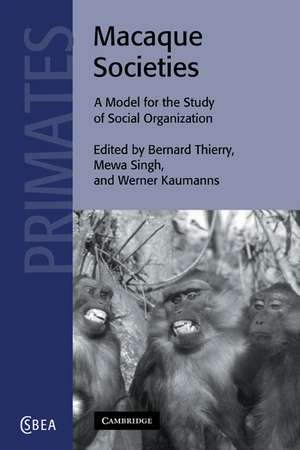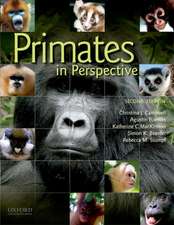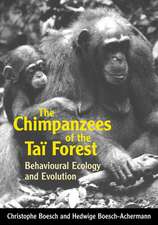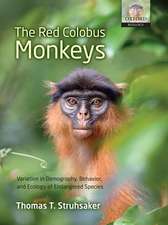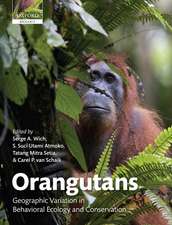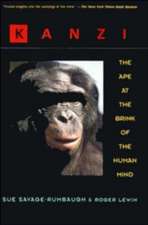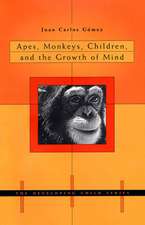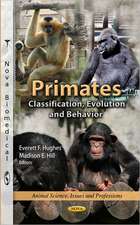Macaque Societies: A Model for the Study of Social Organization: Cambridge Studies in Biological and Evolutionary Anthropology, cartea 41
Editat de Bernard Thierry, Mewa Singh, Werner Kaumannsen Limba Engleză Paperback – 9 iun 2010
Din seria Cambridge Studies in Biological and Evolutionary Anthropology
-
 Preț: 479.80 lei
Preț: 479.80 lei -
 Preț: 390.85 lei
Preț: 390.85 lei - 14%
 Preț: 750.86 lei
Preț: 750.86 lei - 11%
 Preț: 700.59 lei
Preț: 700.59 lei - 14%
 Preț: 722.61 lei
Preț: 722.61 lei - 9%
 Preț: 846.81 lei
Preț: 846.81 lei - 11%
 Preț: 460.98 lei
Preț: 460.98 lei - 11%
 Preț: 566.50 lei
Preț: 566.50 lei -
 Preț: 367.91 lei
Preț: 367.91 lei - 11%
 Preț: 693.77 lei
Preț: 693.77 lei -
 Preț: 356.37 lei
Preț: 356.37 lei - 11%
 Preț: 633.61 lei
Preț: 633.61 lei - 11%
 Preț: 619.90 lei
Preț: 619.90 lei -
 Preț: 396.29 lei
Preț: 396.29 lei -
 Preț: 279.00 lei
Preț: 279.00 lei -
 Preț: 304.74 lei
Preț: 304.74 lei -
 Preț: 371.32 lei
Preț: 371.32 lei -
 Preț: 376.06 lei
Preț: 376.06 lei -
 Preț: 332.66 lei
Preț: 332.66 lei -
 Preț: 421.01 lei
Preț: 421.01 lei -
 Preț: 303.60 lei
Preț: 303.60 lei -
 Preț: 309.27 lei
Preț: 309.27 lei -
 Preț: 376.62 lei
Preț: 376.62 lei - 11%
 Preț: 424.92 lei
Preț: 424.92 lei -
 Preț: 308.50 lei
Preț: 308.50 lei -
 Preț: 317.11 lei
Preț: 317.11 lei -
 Preț: 453.33 lei
Preț: 453.33 lei -
 Preț: 322.41 lei
Preț: 322.41 lei -
 Preț: 433.83 lei
Preț: 433.83 lei -
 Preț: 435.78 lei
Preț: 435.78 lei -
 Preț: 471.93 lei
Preț: 471.93 lei - 11%
 Preț: 474.71 lei
Preț: 474.71 lei -
 Preț: 428.90 lei
Preț: 428.90 lei - 14%
 Preț: 934.70 lei
Preț: 934.70 lei
Preț: 446.28 lei
Nou
Puncte Express: 669
Preț estimativ în valută:
85.42€ • 92.82$ • 71.80£
85.42€ • 92.82$ • 71.80£
Carte tipărită la comandă
Livrare economică 21 aprilie-05 mai
Preluare comenzi: 021 569.72.76
Specificații
ISBN-13: 9780521521680
ISBN-10: 0521521688
Pagini: 440
Dimensiuni: 152 x 229 x 25 mm
Greutate: 0.64 kg
Editura: Cambridge University Press
Colecția Cambridge University Press
Seria Cambridge Studies in Biological and Evolutionary Anthropology
Locul publicării:Cambridge, United Kingdom
ISBN-10: 0521521688
Pagini: 440
Dimensiuni: 152 x 229 x 25 mm
Greutate: 0.64 kg
Editura: Cambridge University Press
Colecția Cambridge University Press
Seria Cambridge Studies in Biological and Evolutionary Anthropology
Locul publicării:Cambridge, United Kingdom
Cuprins
List of contributors; Acknowledgements; Introduction: 1. Why macaque societies? Bernard Thierry, Mewa Singh and Werner Kaumanns; Part I. Individual Attributes: 2. Personality factors between and within species John P. Capitanio; Box 2. Social intelligence Josep Call; 3. The role of emotions in social relationships Filippo Aureli and Gabriele Schino; Box 3. Power and communication Signe Preuschoft; 4. Reproductive life history Fred Bercovitch and Nancy Harvey; Box 4. Life history traits: ecological adaptations or phylogenetic relics? Mewa Singh and Anindya Sinha; Part II. Demography and Reproductive Systems: 5. Demography: a window to social evolution Wolfgang Dittus; Box 5. Patterns of group fission Kyoko Okamoto; 6. Gene flow, dispersal patterns, and social organization Hélène Gachot-Neveu and Nelly Ménard; Box 6. Dominance and paternity Andreas Paul; 7. Mating systems Joseph Soltis; Box 7. Homosexual behavior Paul L. Vasey; Part III. Social Relationships and Networks: 8. Dominance style, social power, and conflict management: a conceptual framework Jessica C. Flack and Frans B. M. de Waal; Box 8. Social space and degrees in freedom Marina Butovskaya; 9. How kinship generates dominance structures: a comparative perspective Bernard Chapais; Box 9. Inter-group relationships Matthew A. Cooper; 10. Intergenerational transmission of behavior Christophe Chauvin and Carol M. Berman; Box 10. Maternal behavior, infant handling, and socialization Dario Maestripieri; Part IV. External and Internal Constraints: 11. Do ecological factors explain variation in social organizations? Nelly Ménard; Box 11. Intraspecific variation: implications for interspecific comparisons David A. Hill; 12. Social epigenesis Bernard Thierry; Box 12. The role of contingency in evolution Christophe Abegg; 13. The use of artificial-life models for the study of social organization Charlotte K. Hemelrijk; Box 13. Primate behaviors and natural selection William A. Mason; Part V. An Outside Viewpoint: 14. An anthropologist among macaques Maurice Godelier; Box 14. Do macaque species have a future? Yasuyuki Muroyama and Ardith A. Eudey; Conclusion: 15. Toward integrating the multiple dimensions of societies Bernard Thierry, Mewa Singh and Werner Kaumann; References; Index.
Recenzii
Review of the hardback: '… although the book concerns macaques, it will be of interest to anyone studying animal social behaviour. … it provides many future directions for the study of macaque social behaviour, and is indispensable reading for anyone interested in the evolution of primate societies.' Primate Eye
Descriere
Explores primate societies and their evolution using macaques as a model.
